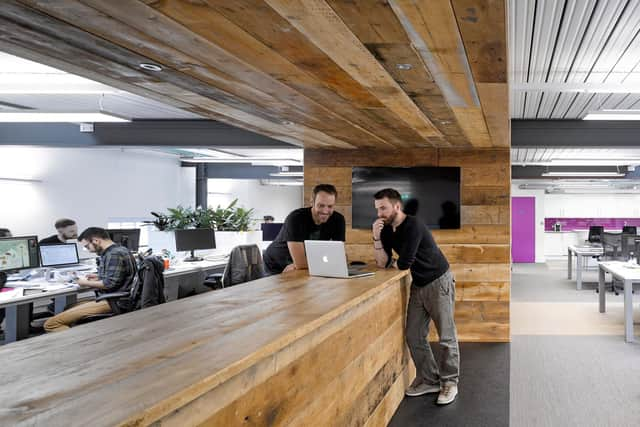A new office landscape for hybrid working - Alexandra Derbyshire


Rather than desperately clinging to a life raft of temporary fixes, we can now use the lessons learned from this past year to create a robust and proactive strategy for keeping our businesses afloat, even in unprecedented times.
Despite the unpreparedness of businesses, homeworking became an effective and accepted way of working. Through observation and data, we can see that most workers remained productive and that many actually found it preferable, thus changing how we interact with the workplace, and what we expect going forward, as both employees and employers.
Advertisement
Hide AdAdvertisement
Hide AdWhile tangible perks like free breakfasts and Friday takeaways have their benefits in luring staff back into the office, employees are now more concerned with the workplace environment as a holistic experience. In today’s candidate-driven market, choice is abundant for workers, and so employers are raising the stakes in order to recruit and retain the best talent. For many, this has taken the form of hybrid working.


The mundane but dependable regularity of the so-called Taylorist office model collapsed with the pandemic, leaving behind a fragmented working day based on a rigid and now largely irrelevant structure, centred within an abandoned office. The problem arises when staff, now accustomed to homeworking, return to an office that is more of a relic than a functional workspace.
Building on observational data and that regarding employee satisfaction, hybrid working is now the norm and the general preference of employees. Free address or activity-based working, for instance, can be highly effective in boosting productivity and wellbeing outcomes at both personal and organisational levels, but this requires a very different office landscape to the one that we are used to.
Replacing traditional desk layouts with free-flowing, open space allows for a nomadic vibe, encouraging spontaneous, collaborative and creative conversation, where the sharing of ideas is not limited by tightly scheduled Zoom calls or the worry of whether it’s important enough to justify bothering a co-worker with a phone call or email.
With this comes the reinforcement and fostering of one of the most valuable and attractive aspects of the office: the social. Catering for hybrid working in turn creates the social opportunities crucial to the cohesion, wellbeing and success of an organisation. Soft furnishings, private call pods and biophilic design extend the home comforts that we have grown accustomed to. It can provide an inviting and tranquil space away from the chaos that can be associated with homeworking.
The pandemic has emphasised that the socialisation and creative collaboration that the office provides is irreplaceable. So we see the keys to a successful and enjoyable workplace as being functional, sociable and adaptable, each aspect is vital to welcoming staff back to the office. Utilising intuitive, human-centric design means that the space can be flexed to suit the changing requirements of the organisation and its staff, resulting in a proactive strategy and adaptable environment that can withstand any future Covid-19 aftershocks.
Alexandra Derbyshire, Business Manager, HK Surveying & Design
Comments
Want to join the conversation? Please or to comment on this article.